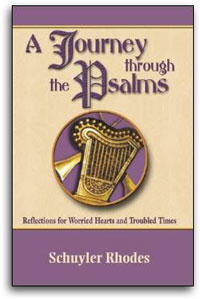Psalm 19
Preaching
A Journey Through the Psalms: Reflections for Worried Hearts and Troubled Times
Preaching the Psalms Cycles A, B, C
Object:
"The law of the Lord is perfect...." In a suspicious and cynical generation like this one, such a claim is automatically suspect. In the first place, protestants with sketchy education have learned from Saint Paul that law is not to be trusted. In the second place, again with sketchy educations, any notion of perfection is not only suspect, it is to be discounted. Perfect law? It would be easier to convince the Navy to put screen doors on submarines as it would be to convince this generation of a perfect law of God.
The struggle, though, is compounded when one hears that this law of God is not only perfect, it serves to revive one's soul and even offers wisdom to the simple.
This is a generation of skeptics. Informed by enlightenment thinking and fueled by the myth of scientific proof, people scoff openly at the notion that a precept of the Lord could both be perfect and good.
Yet, it is true. If we understand the "law" of the creator to be written, not only in our sacred texts but in creation itself we begin to get a glimmer of the truth and depth of this claim. Consider some of the more basic laws. The ancient dietary laws were not there merely to set up kosher kitchens. They were there to protect the health of the community. One didn't eat pork, quite frankly, because under food storage conditions of the day, it was frequently fatal to do so. The Ten Commandments are not mere exercises in following the whims of a capricious deity. They are practical, life-giving processes for the purpose of guiding a community.
It makes sense that we should not steal from one another. Rampant theft leads to chaos and chaos to the destruction of community. One wishes some of the predatory lenders working over the past years had heard of such a law. Neither does it take a world-class sociologist to figure out that killing people doesn't lead to a productive and healthy community. So it is that the "Thou shalt not kill" commandment has power for us, especially today.
Yes, the law of the Lord is indeed perfect. Saint Paul's introduction of grace does not relieve us from the sacred calling to follow God's leading. Indeed, following these laws does lead to health, wholeness, and strength.
Perhaps this generation would do well to trade in its skepticism for a modicum of trust and prayerful reflection.
The struggle, though, is compounded when one hears that this law of God is not only perfect, it serves to revive one's soul and even offers wisdom to the simple.
This is a generation of skeptics. Informed by enlightenment thinking and fueled by the myth of scientific proof, people scoff openly at the notion that a precept of the Lord could both be perfect and good.
Yet, it is true. If we understand the "law" of the creator to be written, not only in our sacred texts but in creation itself we begin to get a glimmer of the truth and depth of this claim. Consider some of the more basic laws. The ancient dietary laws were not there merely to set up kosher kitchens. They were there to protect the health of the community. One didn't eat pork, quite frankly, because under food storage conditions of the day, it was frequently fatal to do so. The Ten Commandments are not mere exercises in following the whims of a capricious deity. They are practical, life-giving processes for the purpose of guiding a community.
It makes sense that we should not steal from one another. Rampant theft leads to chaos and chaos to the destruction of community. One wishes some of the predatory lenders working over the past years had heard of such a law. Neither does it take a world-class sociologist to figure out that killing people doesn't lead to a productive and healthy community. So it is that the "Thou shalt not kill" commandment has power for us, especially today.
Yes, the law of the Lord is indeed perfect. Saint Paul's introduction of grace does not relieve us from the sacred calling to follow God's leading. Indeed, following these laws does lead to health, wholeness, and strength.
Perhaps this generation would do well to trade in its skepticism for a modicum of trust and prayerful reflection.


